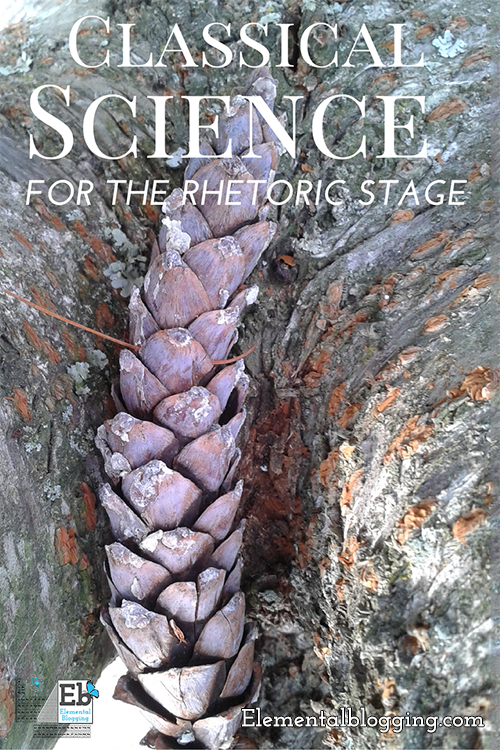 Welcome back to the Classical Education and Homeschool Science series! Here’s a list of the past posts in the series:
Welcome back to the Classical Education and Homeschool Science series! Here’s a list of the past posts in the series:
- Part 1: What is classical education?
- Part 2: Is it really possible for classical science to be rigorous
- Part 3: Classical science curriculum for the grammar stage student
- Part 4: Classical science curriculum for the logic stage student
Today, I want to share with you the nuts and bolts of classical science curriculum for the rhetoric stage.
Rhetoric stage classical science is intellectually demanding, just like all of the subjects at this stage.
That said, what I am going to share with you today is more of a theory. It is based on my research, the ideas laid out in The Well-trained Mind, and my experience co-teaching remedial courses in college.
So bear in mind that there is no program out there (yet) that pulls together all the things I’m going to suggest you do in this post.
What is a rhetoric stage student?
The rhetoric stage typically begins with what traditional school defines as high school and ends when the student is ready to begin college.
These students have already mastered the basic facts as well as some of the reasons behind them. They are now prepared to move onto the more complicated details of science.
On top of that, these students are far more contemplative and when they ask questions, it is obvious that they have put some thought into the inquiry. However, they are still working on knowing how and when to express themselves.
I like to compare the rhetoric stage student to a law student. He has access to a great deal of organized, filed away information, but he is still learning advanced techniques, as well as learning when to use the material and how to apply it.
So, when you teach science to these students, you will be playing to their intellectual strengths while teaching them how to filter what they know and apply it to the current situation.
You can also use science to work on the basic skills of research and note-taking at this stage.
What are your goals for rhetoric stage classical science?
You have two goals for the high school years:
- To make sure that the students know and understand the principles and laws at work in science.
- To teach them how to relate what they have learned to the things they see around them.
Remember that these students have a mastery of the foundational facts and principles at work from the previous two stages. Now is the time to teach them how to apply that information along with the more complicated laws and the mathematics of science.
In a nutshell, your goals for the rhetoric stage student will teach him to learn and apply the principles of science to what he sees in front of him.
How do you teach classical science to rhetoric stage students?
A good rhetoric stage classical science curriculum will be rigorous, but I’m going to suggest that the level of rigor will be dependent upon what your student wants to do in the future.
Let me be clear in saying that I believe that all rhetoric stage students would benefit from taking four years of science in high school. Science is beneficial because it trains the brain to think logically, plus science gives every student a healthy awareness of the world around them.
However, by the time students reach the rhetoric stage, they are starting to get a clearer picture of where they would like to go and what they would like to do. If your student is not scientifically inclined, it is perfectly acceptable to scale back the suggested expectations to just the basic components laid out below.
With that said, a good rhetoric stage classical science program should the following three basic components:
- Textbook with Experiments — The students should be studying from a standard high school textbook, such as Campbell’s, Prentice-Hall, or Science Matters. Plan to complete one text per year by having the students read through a section or two each week, taking notes as they go. If you choose, you can have them write a brief report about what they have learned once they are finished the full chapter. You will also need to add in experiments that coordinate with what they are studying. Some of the texts mentioned above will already have experiments in them, but for others, you will need to add in an experiment book or design your own experiments.
- Events in Science — Depending on what the students are planning on doing, you can alter the level of rigor of this component. For a more rigorous curriculum, have the students read the original writings of great scientists, such as Hippocrates or Aristotle. For a more relaxed approach, have the students read books that have been written about the great scientists or the major events that have occurred in a given field. You can choose to have them read about scientists and events that coordinate with the historical period you are studying or you can have them take a look at the major events and scientists within the field of science you are examining. Either way, Barb from Harmony Art Mom has created a Squidoo lens on living books for high school science that can help you select suitable books.
- Exams — Rhetoric stage students are becoming more and more independent with their work, so testing is necessary to affirm that they have learned the concepts. Plus, they will be expected to know how to perform on a test as they progress towards the college level. So, for these years, I recommend that you include exams as a component of your curriculum plan. The questions on the exams should be mathematical problems, short answer questions, and essays. They should require the students to think and draw upon the knowledge they have gained.
The optional components are: (Note: These components should be included for the student who plans on majoring in the sciences.)
- Research Paper — A rhetoric stage classical student should be doing two in-depth research papers per year and science is a good subject to use to complete this requirement. The papers can take anywhere from 6 weeks to several months to complete and should be loosely associated with what you are learning for the year. The students can choose to research a scientist or an important discovery within the field they are studying. Their completed paper should be 6 to 8 pages in length. It must include a thesis statement which causes the students to form and defend an opinion about the material. It should also touch on why they chose the topic, how it affects them and what they have found out about the subject.
- In-depth Project — The in-depth project will have all the components of the scientific method, but will be more complex than the science fair project typically done in the middle school years. The students will still come up with a question, do some research, make a hypothesis, design an experiment, analyze their results and draw a conclusion, but on a much deeper level. This in-depth project should take about a semester to complete, the students will be looking at least 2-3 variables, and it will take several experiments to fully test their hypothesis.
When you plan out your year of rhetoric stage science, try to have all 4 areas of study tie together, although this will be a bit harder to do than in other years. Here’s an idea of what it can look like:
- Have the students read a chapter on plant and animal cells and look at the different cells under a microscope;
- Have them study Robert Hooke and his cell theory;
- Give the exam about the information they have learned on cells;
- Have them work on writing a research paper and performing in-depth project within the field of biology.
When you tie all of the areas of study together, they reinforce one another and create a stronger awareness of how the field of science affects the student’s everyday life.
RESOURCES FOR CREATING A CLASSICAL SCIENCE CURRICULUM
I highly recommend the following books to help you formulate a plan for your classical science curriculum:
- The Well-trained Mind: A Guide to Classical Education at Home by Jessie Wise and Susan Wise Bauer — The suggestions in this post are loosely based on this book and I believe that this book should be required reading for all classical educators! It will give you a fuller picture of classical education as well as the learning stages that your students will go through.
- Success in Science: A Manual for Excellence in Science Education by Bradley and Paige Hudson — Brad and I have written this book to be a starting point for those desiring to teach science. It lays out a clear roadmap for teaching this subject in your homeschool. While the book is not aimed specifically at classical educators there are several sections that will help you to gain a clearer picture of what classical science can look like.
If you have any questions about classical science, please feel free to leave them in the comments and I answer them as soon as I am able. Next month, I’ll be sharing more about how the classical science model compares to the traditional model for science education. If you don’t want to miss that article, be sure to subscribe here.

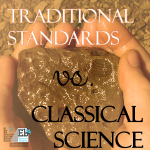
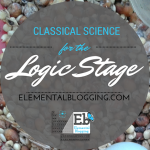
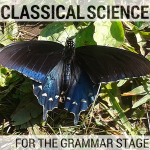

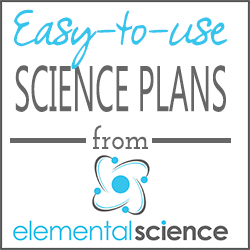
Join the Community!